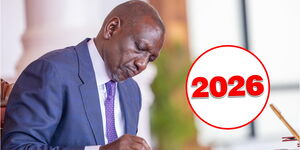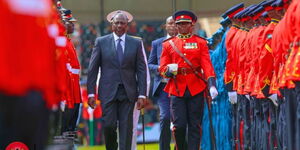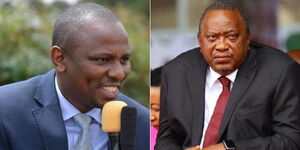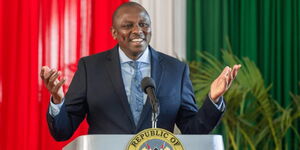Experts reckon that the Kenyan Shilling is likely to cross the Ksh200 mark against the US dollar before year-end.
A report by Bloomberg that asked experts to predict the Shilling's performance under longer time frames indicated that in 2024, the exchange rate will oscillate between a Ksh161.48 yearly low and a Ksh214.72 yearly high.
The economists further believe that in the next seven years, the economic performance will grow grimmer with the shilling expected to hit Ksh300 against the dollar in 2030.
In 2025, experts estimate that the exchange rate will gravitate between Ksh161.48 and Ksh230.30 while in 2026, the figure will rise to between Ksh213.43 and Ksh238.68.
In 2027, the economists believe that the yearly low range will be Ksh229.57 while the yearly high will be Ksh246.00 while in 2028, the Shilling will rise to between Ksh234.77 and Ksh246.00.
In 2029, two years into President William Ruto's second term should he win the vote, the Shilling is estimated to exchange at Ksh257.72 (yearly low) and Ksh310.66 (yearly high). In 2030, the yearly high is expected to hit Ksh359.52.
Speaking to Kenyans.co.ke, Economist Chris Churchill explained that if the Shilling hits the above figures against the Dollar, the ripple effect will be experienced in people's pockets.
He noted that employed Kenyans are likely to lose jobs while companies that rely on external raw materials are likely to downscale due to the costs of importation.
"There will be a ripple effect because Kenya is a net importer country so we rely on getting the goods from abroad. The weaker the Shilling, the more units of the Shilling we will need to be able to import goods," he explained.
"The cost of doing business will go up because the materials that we need are imported hence will dial up the cost of doing business and that might lead to some job cuts across the economy or the businesses shutting down."
Economist Fred Ogolla supported Churchill's view indicating that foreign investors are highly likely to flee the country due to a lower purchasing power.
"There is no sign that the shilling is going to stabilise if not appreciate because the demand for the dollar continues to go up. The US economy is doing very well at the moment. In fact, investors are flocking there," he explained.
"There are three things Kenyans have to prepare for. The cost of living because most of the things consumed locally are imported. Inflation will also go up and there will be a lot of reduction in the foreign-direct investments because the purchasing power of the shilling will go down."
He, therefore, challenged Kenyans to expand their skills making them attractive to local companies instead of relying on jobs from foreign companies.
The grim prediction comes barely a week after Ruto's government announced its plan to discontinue the government-to-government oil deal after it failed to bring down the exchange rate.
The decision was informed by the Treasury's view that the deal had failed to stabilise the exchange rate in favour of the Kenyan currency and ease pressure on the economy.
Since President William Ruto took over the reins, the exchange rate has continued to perform poorly against the Dollar hitting Ksh162 at the time of this writing.
The deal was introduced in April last year with President Ruto promising that the Kenyan currency would stabilise as fuel marketers would purchase products in Shillings and ease pressure on the Dollar.












